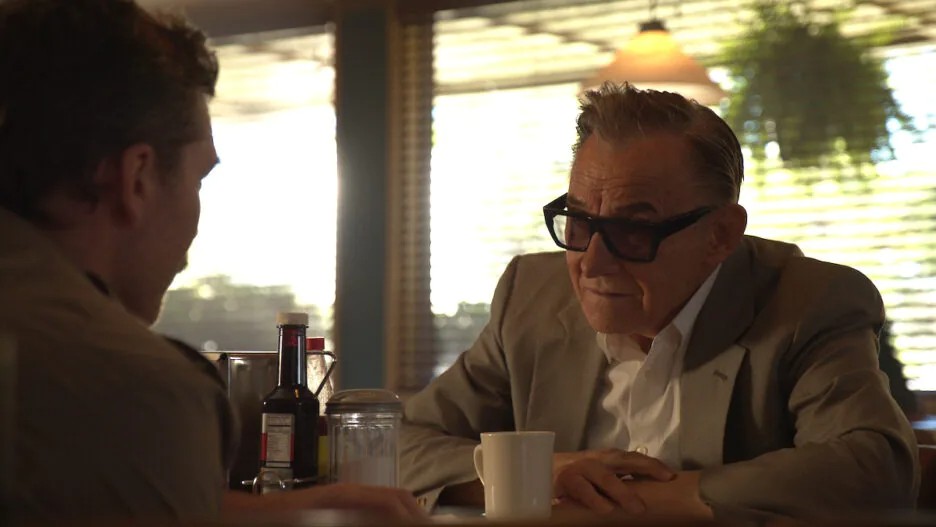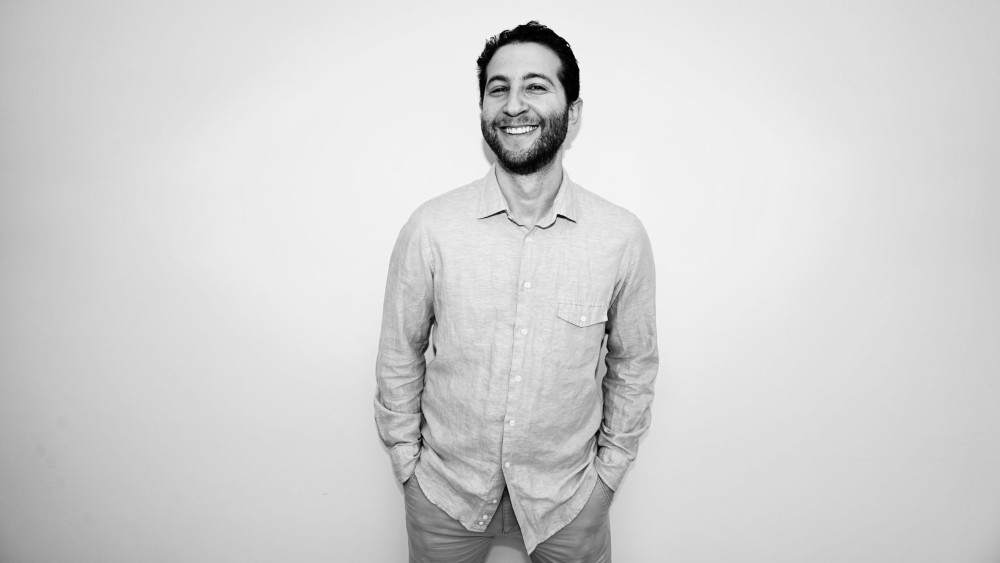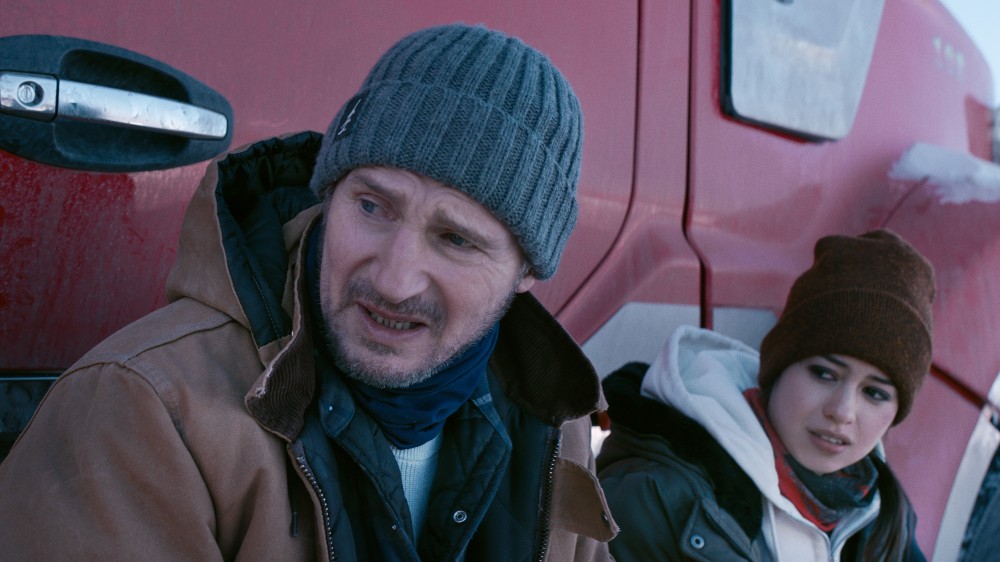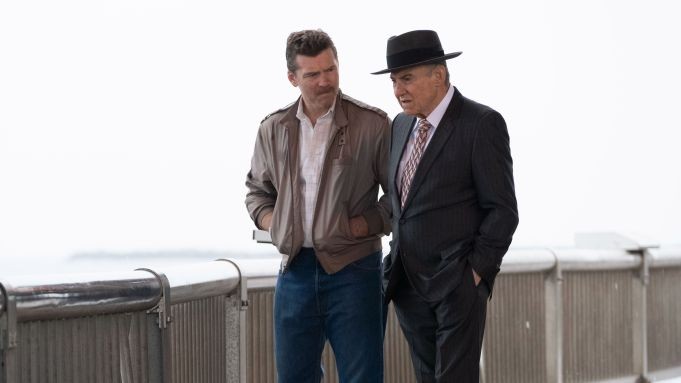
Our latest “Composer Series” shifts back to another relatively younger and newer composer to the world of film and television scoring. Like many composers before him, Max Aruj came through the Hans Zimmer camp, specifically working with Lorne Balfe for the past nine or so years. Aruj composed “additional music” for films like Mission: Impossible – Fallout and television shows like The Crown and Genius, but since 2015, he has been composing the scores for his own feature films and television documentaries.
Aruj’s composing work has started to come to the forefront with scores for 2021 releases, Lansky, Eytan Rockaway’s biopic about “Bugsy” Siegel’s accountant with Harvey Keitel starring as the older Meyer Lansky; and Jonathan Hensleigh’s The Ice Road, starring Liam Neeson, a Netflix action-thriller that would have been just as viable for a theatrical experience. Aruj also provided “additional music” for Balfe’s latest scores for The Tomorrow War and Black Widow.
Below the Line got on Zoom with Mr. Aruj for the following interview, in which we covered a lot of bases.
Below the Line: I always like starting by asking about a composer’s background, since sometimes there are parallels between them.
Max Aruj: I started playing jazz and classical piano, and when I was around six, seven years old, and then I just kept going, played in some bands, chamber ensemble, jazz ensemble stuff, and then I took music theory in high school, and then I started writing music. I think that was the class that really got me on the trajectory to start writing. Then I applied to USC, and I got in, and I went to music school there. And then while I was there, I got an internship at Hans Zimmer’s place Remote Control Productions, and I started working there. On my first day, I met Lorne [Balfe], and then a year after that, I worked for him that next summer, and it went great. No days off, all summer, and then six months after that, they offered me a job before I graduated, and it was a dream come true.

BTL: You said that you played piano as a kid, so do you still write music while sitting at the piano or are computers involved?
Aruj: Coming up with ideas, sitting at the piano is definitely the best place for me to start, but before I complete any piece, I always like to step away and just go on a walk and workshop it and sing it and think about it, to make sure that all of my note decisions and my counterpoint and my harmony and my rhythms, that everything is just the way I want it. Sitting at the keyboard and having the physicality and the technical requirements to make that piece of music, it can sometimes distract you from the necessity to make sure that all those decisions are the best decisions you can make. Being a producer, these days, like every composer has to do, there’s just so much involved with every piece, so taking a step back, as I’ve been learning, especially over the past few months, is a very important part of my process.
BTL: When do you start thinking of instrumentation? Is that after you’ve already written something? Are computers a step in there as well?
Aruj: Yeah, there’s a computer right to my left, my rig. I like to write just literally a piano sound as well, first, because it forces me just to focus on the notes themselves. Sometimes, of course, there might be an instrument that I’m thinking about first, but I think in general, when I want to come up with a main theme for a movie, I’m thinking about the notes themselves first. In, let’s say, a horror scene or something really specific or unusual, I might be thinking of a sound, and I might prioritize that thought.
BTL: Both Lansky and The Ice Road are genre movies, and both very specific genres, so do you try to watch movies in similar genres before writing or do you try to stay away from anything similar before sitting down to write?
Aruj: I knew what kind of the idea was for Lansky — I’ll just focus on that one for a second. We knew we wanted Los Angeles colors, and it’s an epic, and I knew that I want themes. Honestly, after that, I kind of just went for it. It’s easy to get too stuck into one thought — “Oh, I want it to be just like this” — and with Lansky, there was no temp. Really, I had quite a big range I could go for, and I just went for it. The good thing about having no temp is there’s no, “Oh, the temp is better here.” I really need to write something completely from the ground up, and it took a long time, and it was really hard, but I think worth it. But yeah, after the general guidelines were set, I just went for it.

BTL: What were some of your conversations with Jonathan Hensleigh like for The Ice Road, which I guess he finished filming just before COVID hit?
Aruj: That’s right. It was perfect timing for me. I met him in September — we spoke on the phone. We had our first phone chat then, or end of August, and he’s just such a blast. He’s just so full of energy. Meeting him during COVID was the ideal situation, because he just got me so excited about working with him, and then I got the gig, and he showed me the movie, and I was super-excited. Who doesn’t love Liam Neeson? It was a fun thrill-ride movie, and he said, in short, it has to be the perfect or a great action score. There need to be themes, we have to love our characters. It needs to hit the action. It has to follow the characters. We want it to be memorable, and it has to do everything. I stopped counting, because there’s of course infinite things it has to do. But it just needed to be a great score, and it has to be right there with the movie. The music is super loud, which is great. It’s a composer’s dream, and so, everything has to be right, and he wanted to make sure of that.
BTL: Of course, creating the score in a pandemic must have been interesting, although I feel like musicians and composers had it somewhat easier than others. What was the process of getting the music into a recording studio with musicians to record it?
Aruj: For The Ice Road, I was lucky in that we recorded the score in Bratislava, strings and brass, and they did a great job there in Slovakia. I was lucky that the studio was open at that point, and I remember they were a little bit more lax. I think Vienna was open, London I know had some trouble. L.A. was closed, so we were lucky that I was planning on Bratislava, and it stayed open the whole time. I was praying and hoping nothing goes wrong, and it went great. It was kind of like usual when I’ve done it. I have a fantastic orchestrator I work with, named Shane, and he was on board ready to go. We had the stage set, and we started orchestrating a week before the recording session. And we just did it. I used a contractor in London, and it went down so great.
BTL: Did you actually fly there for the recording, or did you stay in L.A.?
Aruj: No, I just did it over Source Connect, which I’ve done many times. It went so well, so well.
BTL: I’ve talked to a few composers who haven’t been comfortable working with musicians over Zoom, although it seems very much like when you’re in the control room of a studio or not that different.
Aruj: I think when I started working with the guys that day. I think the contractor flew them in. They weren’t living in Bratislava. They spoke great English, and they saw how much music I had to record. They know that I’ve worked with Lorne, and when you’re working with Lorne, you’ve got a lot of things to do, and you’ve got to just stay on task. We just went through it all, and then sometimes you have to move on, and you have to skip a section, because if there’s this three-minute section, but you have to jump on and get the next big thematic cue, you just have to make those tough decisions. You’ve gotta be smart about it, and they were super-responsive when I would say, for example, “Guys, we gotta move on,” or “Guys, this isn’t working here. Let’s try it this way.” They did such a great job.
BTL: Was Lansky something you’d finished already before this one? That preceded Ice Road?
Aruj: Lansky, most of the scenes were set, and Eytan had pieces that he liked in every single scene. I think we were starting to feel pretty good in the later part of 2020, and Ice Road, I was starting to get into a really good place end of November. Lansky, now I’m remembering, a few months before that it was in good shape. I, more of that was done before I really got into Ice Road is how that went down.
BTL: What were some of your conversations with Eytan like? If he had no temp music then you must have had more conversations about what he wanted.
Aruj: Yeah, he would give these general thoughts. For example, there’s a boardroom scene, and there’s a big stretch of music there that covers a couple different places and emotions. We’d watch it down, and Eytan would say, “It’ snot right. It needs to be emotional.” And then you’d go and say, “God, I thought what I had WAS emotional.” So you’ve just got to keep trying. It’s hard work, man, it is really tough. But I started to see similarities between cues that he would like and ones that he would have comments on, so I learned along the way. But with a drama, where it’s just looser — it’s not like an action movie where you’ve got to hit this, this and this. It takes more patience, because what you might think is right, you guys might look at it again, and he might say, “Well, what about this? What about this?” so you’ve got to be part of this dance up until the very end.

BTL: You touched upon a topic I like discussing with composers, and that’s communicating with directors, or who or may not have much musical knowledge. I know some are very musical but some not so much, so what were your experiences particularly on these two films?
Aruj: Eytan, he does not have musical knowledge, which we as a composer– I’m sure as other composers you’ve spoken will agree — that you don’t want someone to go and nitpick your music and give music theory lessons or analysis. Eytan was more about “the music needs to do this for this scene.” In a drama like that, that was helpful because there’s different peak characters woven together. I think, in general, any given cue had one stance, and I think that gave the score a strength and hopefully makes it feel like it’s this big brushstroke all done together.
With The Ice Road, the score had to be thematic and emotional, but it had more specific utilitarian things it needed to do. Like it needs to shift right here; it needs to do this here. And then Jonathan would say, “I think the theme, it’s too proud here.” He’d give a really clear comment like that. And then I would know, “Okay, I need to comment down here — maybe do it half-time, not change the bass.” There’s all these different tools you can utilize to make sure that you’re addressing their note. Let’s say another one might be the intro for the movie. The intro for The Ice Road, there was a lot of debate about that. It was not the right instrument, and then too dark one time. You’ve just got to try all this different stuff and be patient, and I’m really happy with the way both of them came out.
BTL: Some of the composers I’ve spoken to, when they have something with temp music, they have a better idea of why it doesn’t work more than the filmmakers usually, but that leads to my next question, which is do you usually write to picture or some form of edit?
Aruj: At first, I try to write themes away from picture and make sure that they’re approved first, and then I’ll go to picture. But, yeah, if there’s a bit that’s not working, and that again, and again, the guys will say no, it’s not right? If you look at the music, and they’ll say no, I like the way it does this, then that’s just the reality of the way that businesses, and you think, “Okay, I’m doing something wrong. And I need to wrap it up the way the temp does it here, or I need to switch here.”
It’s part of being a team player, I think because they’ve gotten used to the way it does that. And chances are the reason there’s a reason the way it does that. And now for people who see black widow, this coming weekend, which I think many, many, many people will, there’s so many shifts that have to happen in a two and a half-hour action movie. If you miss these points, you’re gonna be in trouble, and you might be missing a plot point. Or you might be pacing over some really important dialogue. And when you don’t have a ton of time, then you’ve got to pick your battles as, as you’d say.
BTL: Another thing I’ve noticed is that when a movie uses needle drops or existing songs, they might not always work compared to something written specifically for a scene. I’m not sure you had to deal with that so much, maybe on Black Widow?
Aruj: Black Widow, I’m trying to remember I haven’t watched it in like a year and three months, but actually both films, there was some… it’s just part of being a composer, that you get looped and roped into these conversations about songs, because, for example, I’m not giving anything away, but in Lansky, the Murder Inc. montage, where a very famous song was used — they used “Hava Nagila” there. I did versions of that, and then it went over to a song, and that was something he was considering the whole time, but we still entertained score options there. So that was an example.

Steven Rosenblum was the editor on Lansky, and I love the way he did that casino montage with that lounge/jazz piece. I thought that was fantastic — it was one of my favorite parts of the movie. The Ice Road, they had a deal with Big Machine, so they were always kind of swapping songs around, and I remember there was a moment where we were considering the beginning of the movie, when we meet one of the characters, Tantoo, to use a song there, and also to use a song at the end of the movie. So I had options ready for all that. I’m glad I did, because it ended up being score for those bits.
BTL: Did I hear some didgeridoo in Lansky? Is that possible?
Aruj: Didgeridoo in Lansky… you know what? No, you know what you heard there. You need Joshua Hoffman — he’s a really talented singer, and that’s him doing some really low notes. And then what I would do sometimes is I would take him and I would double him an octave lower. So he already had a really deep voice that almost sounded like Tuvan throat singing, and then putting it even lower gives this really unusual kind of holy quality. Thank you for asking that, because we worked towards something like that, Eytan and I, for a long time to give this choral sound, and we got it and that was something that took time to get there as well.
BTL: How are you on the production side of things, because I feel like composers are more and more having to deal with the sound design as well. Do you feel like you can do a lot of that kind of stuff on your own?
Aruj: After working for so many years, you’ve just got to be able to do it all. So, Lansky, I did that fully on my own, and then on Ice Road, I had some help from a couple friends. One of the guy’s names is Daniel Stockdale, he’s fantastic, and he did some production stuff with me on The Ice Road as well.
BTL: Were you working with Lorne on Black Widow, which was done over a year ago? And was Tomorrow War something you were involved with in between these other projects, as well?
Aruj: I hadn’t looked at Tomorrow War for a long time. Lorne was on that for a long time, so I hadn’t looked at that music in two years, a year and a half, so that evolved so much without me. I actually watched it last night, and I loved it. Fantastic special effects, too. I think they did a great job with that. I can’t speak to Tomorrow War much — so much happened after I left.
BTL: What have you been working on since finishing those two movies?
Aruj: So right now, I’m working with some artists on some songs, which is always a nice change of pace, is working with them. It’s just a different thought process, and it’s a different timeline. They are on their own schedule, especially these days, where, in general, they’re not beholden to a label, or they are the label. I’m working with them on a couple of tunes, and I’m also working on a documentary about the election.
BTL: I assume that’s the Presidential election, you’re referring to. Is that the first documentary you’ve scored, or have you done others before that?
Aruj: I’ve worked on a few documentaries. This is Football — it was on Amazon, it was about soccer. That was a fantastic one. That was a six-part series that I did, and that was a cool journey ’cause I didn’t know a ton about soccer, but just watching it, it was fantastic. There’s so much history, and it’s such a cultural hub in Europe as a whole. So it was just amazing to work on that. This one about the election, I’m taking some state songs and weaving them into the score, and then doing kind of a dramatic score as well, for the overarching idea what’s going on with the election. I’m excited about that one as well.
BTL: Who’s directing that?
Aruj: Her name is Emily Carlson. She’s done a short that I worked on two years ago now. She traveled around to different states and did interviews during the election, during quarantine as well.
BTL: These songs you’re doing with other artists, is that for their records, or are you trying to your own musical project as well?
Aruj: That is for their records. One of them, I might be co-doing it with him, but I don’t really mind either way. I think part of being a writer, and especially in the pop world, it’s just about working on tracks. What’s nice about being a film composer is that you get to write it, and you get to be the person responsible for performing it or whatever, so that’s an exciting thing. With the pop tracks, I don’t know how we’ll do it. One of them, I’m sure will be on his label, and the other one, I don’t know how he’s going to do it yet.
BTL: It’s great talking to you, and it’s nice to hear about your connection with Lorne, which I didn’t know about, but I love both of those scores as well. Maybe someday, I’ll get to talk about him, and I’ll ask about you.
Aruj: Absolutely. He’s the reason I’m able to do all this stuff and I know how to do all this stuff. He taught me everything.
BTL: What is one thing you learned from him that you continue to use on every score you write?
Aruj: It’s the idea that you should always try to write a great theme for everything you do. And that can be a melody or something else, but the issue is if you don’t have a good theme to fall back on, then it’s so easy to write a score that has no identity. At the end of the day, we’re always trying to write a beautiful piece of music, and the way you say you’re able to listen to the scores, and I’m so happy to hear that, because it’s easy to spend all this time in film music and just only trying to be functional. That is not the best you can do. We all got into the business because we love a score or a piece of music like E.T. or Gladiator.
I say it in a grounded way, but everything we do, we should try and make as good as it can be, and the best thing we can be. In the process of scoring a film, it’s easy to get sidetracked from that and focusing on the real task, which is to make a film score that does well and makes everyone happy and that does its job. But there should be moments where at least you should try to give it that elevated feel that you’ve always wanted to give something.
The Ice Road is now available on Netflix, Lansky is now available On Demand, The Tomorrow War is on Amazon Prime Video, and Black Widow is now in theaters and on Disney+ with Premier Access.





